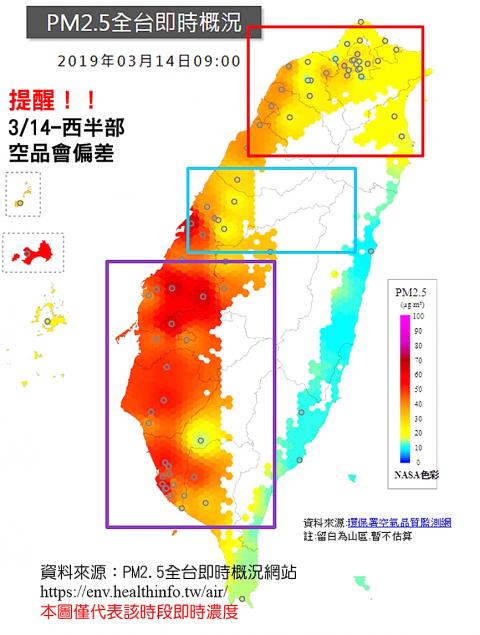Taichung residents in seven districts are being exposed to higher concentrations of eight first-level carcinogenic air pollutants, and the government should be treating the city’s pollution as a national security crisis, an academic told a public hearing on Saturday.
The hearing held by the Taichung Environmental Protection Bureau at Chung Shan Medical University focused on the bureau’s latest report on the city’s air pollution and its effect on health.
People living in districts near the state-run Taichung Power Plant, which has 10 coal-fired units and four oil-fired units, the Dragon Steel Corp plant and the Central Taiwan Science Park are exposed to eight first-level airborne carcinogenic pollutants, including arsenic, dioxin, cadmium and nickel, said Liaw Yung-po (廖勇柏), a professor at the university.

Photo: CNA
The concentrations of carcinogenic pollutants are higher in Longjing (龍井), Situn (西屯), Dadu (大肚), Daya (大雅), Cingshuei (清水), Houli (后里) and Wuci (梧棲) than the city’s other districts, Liaw said his research had found.
People who inhale such pollutants, regardless of the amount, face certain health risks, Liaw said.
The concentrations of the pollutants are related to the level of PM2.5 — fine particulate matter measuring 2.5 micrometers or less in diameter, he said.
The air pollutants interact with other environmental factors as well as viruses, and pose a greater danger to pregnant women, the elderly and children, he added.
The government must tackle the pollution problem by monitoring the first-level carcinogenic pollutants and work to curtail or eliminate their concentrations in the air, Liaw added.
The government should allocate more funding to research on diseases caused by air pollution, said Shang Chun-hsi (尚君璽), an assistant professor at Tunghai University.
Taichung-based physician Lai Yi-chun (賴怡均) called on environmental authorities not to “beautify” air pollution data, so that people can be aware of the dangers.
The bureau’s report proves that the city’s air pollution is related to the power station and the steel plant, and the government should force them to reduce their emissions, Homemakers United Foundation member Hsu Hsin-hsin (許心欣) said.
The bureau said it would take into account the opinions as it works to improve its pollution control efforts, adding that three other public hearings would be held later this month.

CHANGING LANDSCAPE: Many of the part-time programs for educators were no longer needed, as many teachers obtain a graduate degree before joining the workforce, experts said Taiwanese universities this year canceled 86 programs, Ministry of Education data showed, with educators attributing the closures to the nation’s low birthrate as well as shifting trends. Fifty-three of the shuttered programs were part-time postgraduate degree programs, about 62 percent of the total, the most in the past five years, the data showed. National Taiwan Normal University (NTNU) discontinued the most part-time master’s programs, at 16: chemistry, life science, earth science, physics, fine arts, music, special education, health promotion and health education, educational psychology and counseling, education, design, Chinese as a second language, library and information sciences, mechatronics engineering, history, physical education

The Chinese military has boosted its capability to fight at a high tempo using the element of surprise and new technology, the Ministry of National Defense said in the Quadrennial Defense Review (QDR) published on Monday last week. The ministry highlighted Chinese People’s Liberation Army (PLA) developments showing significant changes in Beijing’s strategy for war on Taiwan. The PLA has made significant headway in building capabilities for all-weather, multi-domain intelligence, surveillance, operational control and a joint air-sea blockade against Taiwan’s lines of communication, it said. The PLA has also improved its capabilities in direct amphibious assault operations aimed at seizing strategically important beaches,

‘MALIGN PURPOSE’: Governments around the world conduct espionage operations, but China’s is different, as its ultimate goal is annexation, a think tank head said Taiwan is facing a growing existential threat from its own people spying for China, experts said, as the government seeks to toughen measures to stop Beijing’s infiltration efforts and deter Taiwanese turncoats. While Beijing and Taipei have been spying on each other for years, experts said that espionage posed a bigger threat to Taiwan due to the risk of a Chinese attack. Taiwan’s intelligence agency said China used “diverse channels and tactics” to infiltrate the nation’s military, government agencies and pro-China organizations. The main targets were retired and active members of the military, persuaded by money, blackmail or pro-China ideology to steal

The High Prosecutors’ Office yesterday withdrew an appeal against the acquittal of a former bank manager 22 years after his death, marking Taiwan’s first instance of prosecutors rendering posthumous justice to a wrongfully convicted defendant. Chu Ching-en (諸慶恩) — formerly a manager at the Taipei branch of BNP Paribas — was in 1999 accused by Weng Mao-chung (翁茂鍾), then-president of Chia Her Industrial Co, of forging a request for a fixed deposit of US$10 million by I-Hwa Industrial Co, a subsidiary of Chia Her, which was used as collateral. Chu was ruled not guilty in the first trial, but was found guilty